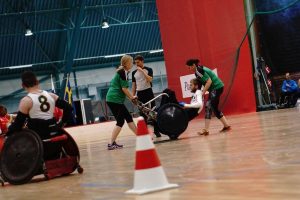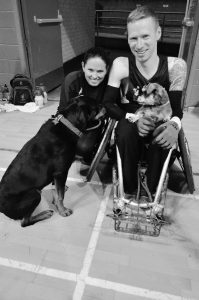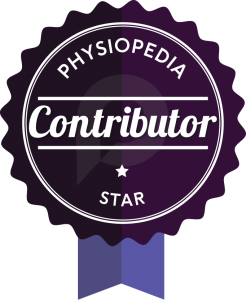The top contributor for March is Naomi!
Naomi contributed to the launch of MOOCs (Massive Open Online Courses) and the new program for spinal cord injuries at Physioplus. Well done, Naomi! Read on to learn more about Naomi's inspiring background and experience.
Your name: Naomi O’Reilly
Time active with Physiopedia:
I started as a volunteer shortly before I finished my physiotherapy studies in 2013, about 6 years and 8 months in this phase.
Current role at Physiopedia:
I am a learning architect who essentially develops courses for Physioplus. This includes a number of different tasks, including course development; including curriculum and structure, creating new pages for the course, relevant case studies and tests. My favorite part of working with Physiopedia was my involvement in the development and coordination of MOOCs (also known as Massive Open Online Courses). These have given me the great opportunity to work with a number of experts in their field and to provide learning opportunities that are relevant to physiotherapists around the world.
Where did you go to university?
I came to physiotherapy as a second career. I first studied sports science and administration at Nottingham Trent University, where I specialized in handicapped sports, and then completed my MSc Adapted Physical Activity at Katolieke Universitite Leuven, Belgium, and the University of Limerick, Ireland. After nearly 15 years in disability sports, I decided to return to university to do my degree in physiotherapy at the Royal College of Surgeons Ireland. I am currently studying for my MSc in Advanced Pediatrics through flexible learning at University College London, which has been an exciting experience so far.
Where do you work? 
I am currently working in Ireland at HSE (Irelands National Health Service) as part of primary care. I am currently working in a pediatric disability service, but I prefer to work either in basic pediatric care or in a pediatric service in an acute care hospital because it covers a wide range of age groups and conditions and does it differently each day. that i love.
Describe your role:
I am still a rotational physiotherapist, of whom I am not a big fan, and I would like to specialize in pediatrics, which is why I am currently completing my MSc Advanced Pediatrics. In my current position in the Pediatric Disability Service, I work both in an early intervention team (0 – 5 years) and in a child disability team (6 – 18 years), in which a wide range of diseases including physical and mental impairments including ASD (Autism Spectrum Disorder ).
What is the most rewarding part of a physiotherapist?
Working with people and being able to help them realize their potential, be it coming back to something they haven't been able to do for a while or helping them develop a new skill they couldn't before to do. Working in pediatrics also gives me the opportunity to play, fall on the floor, spend time with children and help them find out what they are capable of.
What are some of the more difficult aspects of being a physiotherapist?
Navigating the system within my work and realizing that I cannot always give people what they need or want, that there are sometimes restrictions that affect my options, be it service restrictions, financial restrictions or in some cases disease-specific restrictions. At the same time, it is often these challenges that make physiotherapy such an interesting field of work.
The other challenge I found before I became a physiotherapist is the challenge of staying up to date. Physiotherapy is constantly changing, new insights are constantly being developed, there can be so many conflicting views that you have to take into account and constantly learn. This can feel a little overwhelming at times when trying to figure out the best options for the people you work with, but it's also one of the reasons why physiotherapy is such an interesting career.
What are some of your professional passions?
I mostly became a physiotherapist because I believe in the importance of physical activity and make sure that everyone has the opportunity to be physically active in some way. In pediatrics, physical activity is associated with play, the ability to participate in play and ensuring that the children I work with have the opportunity to participate and work with peers, something that is very important to me.
I am also a big supporter of the role of physiotherapy in global health and development, the role we can play on a global scale by improving our profession and sharing our knowledge.
What are some of your personal passions?
I love to travel, see new places and experience new cultures. Traveling is one of the few things you can buy that will make you richer and I take every opportunity to explore it, be it in my region, nationally or internationally.
I also love to read. It is great to be able to enter a new world, experience things from a different perspective and see the world in a book through the eyes of others. Sometimes it's nice to just step away from the here and now and get lost in a book.
After all, I love my dogs, the best I can get home to after a crazy day. I have 3 dogs (1 Rottweiler and 2 miniature schnauzers), all female, who are full of character, love and play …
What would you advise a newly graduated physiotherapist to do?
Try not to feel overwhelmed the first time you start, don't be afraid to ask for help and support, be open to different ways of thinking and just keep learning. You will never know everything, nobody does and it is okay to admit that. Have fun learning on the way!
 Where do you see yourself in 5 years?
Where do you see yourself in 5 years?
This is a very difficult question. I've changed my career direction frequently over the years, mainly because there are so many areas I'm interested in. I would like to be in a managerial position, preferably in the field of pediatrics, and would like to be involved in something related to research. I love teaching too, so who knows!
What is the best thing about being a Physiopedia volunteer?
First and foremost the team! Physiopedia is really a team, more like a family. I had the opportunity to work with and meet some fantastic physiotherapists and non-physiotherapists (Tony of course) and was involved in a variety of different activities.
I had the opportunity to develop the MOOCs with Rachael and a large number of experts in a number of areas including cerebral palsy, clubfoot, wheelchair service and others that provide a relevant learning experience in which part of the work do you live where is a low resource environment or a technologically advanced hospital?
How did it help you to advance your professional development / career as a volunteer at Physiopedia?
It was my first time studying Physiopedia before I finished my physiotherapy studies, partly due to the resources available in Physiopedia and partly to easily highlight my own CPD (Continuing Professional Development) . It keeps me thinking about the evidence, thinking about the options available, and asking me to examine the available evidence.
What are your hopes and aspirations for Physiopedia?
That it continues to grow and evolve and bring forth wonderful people from all over the world to make it an integrative, amazing resource for our profession. That it continues to make this resource available to everyone and that physiotherapists who do not have the same access to learning and courses as I do in Ireland, have access to really good CPD and learning.
What is your favorite course on Physioplus?
 I have always loved the MOOCs, I think mainly because Physiopedia has worked with some great organizations and experts to develop these courses and they always make sure that they serve physiotherapists in all types of environments.
I have always loved the MOOCs, I think mainly because Physiopedia has worked with some great organizations and experts to develop these courses and they always make sure that they serve physiotherapists in all types of environments.
My other favorite course is the Global Health Program, a series of courses dealing with global health and its importance for physiotherapy. I think this area is becoming more important every day, with the changing face of the world and the global environment that affect our work every day.
Do you have anything else to say?
If you've never thought about volunteering, think about it now. It could be easy to get involved in the One Page Project and take responsibility for a page on a topic you are passionate about. Or who knows where else it will lead! But I can tell you with certainty that you will meet some wonderful, like-minded people and have fun while you continue to challenge yourself while studying.
I would particularly like to thank Rachael and Tony. They both gave me great opportunities to develop over the years that I have been involved in Physiopedia, and I loved it!